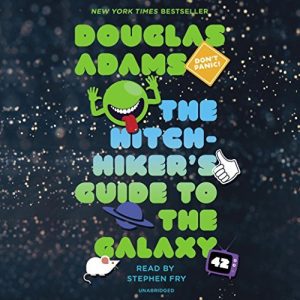 (or the peculiar motives to read)
(or the peculiar motives to read)
It’s no secret that we at Books We Read also host the Summer Tales Book Club, the reading program of the Rutgers Summer Session in the summer of 2020. Using preparation for the short story discussion as a lame excuse to read more, we have also been busy collecting titles for book recommendations related to the short story of the month.
The first short story we picked for the students to read is Neil Gaiman‘s How To Talk To Girls At Parties, as suggested by Lila for a discussion in the Fall 2019 semester. As a public librarian, she now runs her own book recommendations on YouTube, if you like this choice of hers. Spoiler alert: you will also read about our Summer Tales experience in a blog post soon.
Taking a closer look at the Gaiman story, one gets that sinking feeling. Something that vaguely reminds you of books that you should have read, the ones you have missed. You know, titles that you feel embarrassed not to have read when in good company, like The Hitchhikers Guide to the Galaxy (HG2G) by Douglas Adams, first published in 1979. Then you discover Neil Gaiman’s book Don’t Panic: The Official Hitchhiker’s Guide to the Galaxy Companion. Sixth sense working?
I must admit I haven’t read The Hitchhikers Guide to the Galaxy. Instead, I chose to listen to the audiobook version. Summer is not only the perfect period for pleasure reading, but also the time for audiobooks! Guilty as charged — Neil Gaiman was only one reason for picking this book. A more relevant motivation was the narrator of the audiobook, who helped me digest this weird but popular book more easily than expected.
How did I end up with HG2G? I discovered that I can “read” something that I normally would not. As I was listening to some audiobooks, namely Robert B. Parker’s Spencer series (inspired to read by its location: one of my favorite cities, Boston), as a librarian with an eye to details like this, I noticed that the “narrator” of the audiobooks also happens to be a searchable field in the bibliographic record of the book. I found more Spencer books by searching “Joe Mantegna” as narrator. Familiarity breeding comfort: the voice of Detective Rossi from Criminal Minds, perfectly dramatizing a variety of characters in intonation and pronunciation, from crooks to angels, from Harvard to Boston underground.
This was a eureka moment. Does anyone remember the big debate whether to listen to the Harry Potter series in the British or the American version narrated by Stephen Fry or Jim Dale? I love them both, but if I have a tiny little MP3 player with only 8 MB of space that I can take with me to an uninhabited island for the rest of my life, it would be the version narrated by Stephen Fry. A longing for more comfort-listening prompted me to run a search with his name as narrator in the three ebook/audiobook platforms available via my public library (CloudLibrary, RBDigital, and Libby). Since he’s a well-known children’s book narrator, no wonder I found Winnie the Pooh, but the most widely available title was The Hitchhikers Guide to the Galaxy. I was doomed to listen to it for the next two days.
Often called an international multimedia phenomenon, the book comes in a wild variety of versions (radio play, vinyl LP, audiobooks recordings, video games, comic books, television series, stage shows, and movies) with the plot following the last surviving man’s adventures after the Earth had been demolished. Arthur Dent, the lucky survivor, is rescued by a humanoid alien, Ford Prefect, who happens to be the contributor to a fictional electronic guide book called The Hitchhiker’s Guide to the Galaxy. Originally meant to be a narrative device, the “Book,” which predates the Internet, turned out to be the archetype of a shared information resource free to be edited by anyone. Sounds familiar? Later someone even developed an app that turns your iPad into the “Book.” A mixture of comedy and science fiction, The Hitchhikers Guide to the Galaxy has the potential to appeal to all kinds of audiences and is definitely a conversation starter.
Narrated by Stephen Fry, who played the role of the “Book” in the movie, HG2G was a pleasure to listen during sweaty summer runs and stop-and-go dog walks. The audiobook platforms allow one to download the nearly 6-hour book and listen offline. There was a wait on Libby, but one can place a hold, and most library patrons practice good sportsmanship and return early, before the 14-day borrowing deadline. The CloudLibrary version seems to be available more easily.
The technology tools in the books are amazing, even though some made me chuckle in public behind my facemask. Would you like to try a Babel Fish in your ear? You’d be able to hear any language translated immediately into yours! A crisis inducer to create an artificial crisis situation to sharpen your brain? A Nutrimat to offer drinks that your tastebuds like the best? A Googleplex Starthinker computer to solve all your problems? Some Sens-O-Tape to immerse in some recorded event and experience it with all your senses?
Not sold yet? Check out my favorite character, Marvin the Paranoid Android, another familiar voice in the movie, Alan Rickman (Professor Snape). Troubled with depression, the robot aboard the starship Heart of Gold has a “brain the size of a planet.” To its dismay, there is no chance to use even a fraction of its brain power, ever. Stuck in a dead-end job, can anyone relate during their Marvin moments?
In these days we could definitely use Informational Illusion without the physical harm, or some of the “Hitch-Hikeriana” or spin-off merchandise, such as the famous Don’t Panic towels. “The Answer to the Ultimate Question of Life, The Universe, and Everything by the computer Deep Thought,” the number 42, still doesn’t quite make sense to me, but admittedly, I am a big fan and early adopter of S.E.P. theory — that’s Somebody Else’s Problem!
- The Hitchhiker’s Guide to the Galaxy (Audible, free with trial)
- The Hitchhiker’s Guide to the Galaxy (OverDrive / Libby – find in your library)
- The Hitchhiker’s Guide to the Galaxy (eBook, borrow from the Internet Archive) cover art
